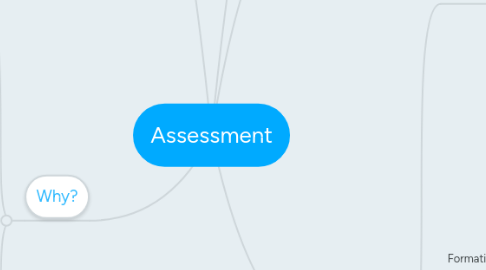
1. When?
1.1. end of unit
1.2. end of term
1.3. end of year
2. tools
2.1. Rubrics
2.2. Continuum
2.3. Checklists
2.4. Anecdotal records
3. Assessment techniques
3.1. Selected responses
3.2. Process-focused assessments
3.3. Open-ended tasks
3.4. Performance assessments
3.5. Observations
4. Why?
4.1. Teachers
4.1.1. inform every stage of the teaching and learning process
4.1.2. plan in response to student and teacher inquiries
4.1.3. develop criteria for producing a quality
4.1.4. gather evidence from which sound conclusions can be drawn
4.1.5. provide evidence that can be effectively reported and understood by the whole school community
4.1.6. collaboratively review and reflect on student performance and progress
4.1.7. take into account a variety of learning styles, multiple intelligences and abilities including different cultural contexts
4.1.8. use scoring that is both analytical (separate scores for different aspects of the work) and holistic (single scores).
4.2. students
4.2.1. share their learning and understanding with others
4.2.2. use a variety of learning styles, multiple intelligences and abilities to express their understanding
4.2.3. know and understand in advance the criteria for producing a quality product or performance
4.2.4. participate in reflection, self- and peer-assessment
4.2.5. base their learning on real-life experiences that can lead to further inquiries
4.2.6. express different points of view and interpretations
4.2.7. analyse their learning and understand what needs to be improved.
5. types
5.1. Objective
5.1.1. Multiple choice
5.1.2. true / false
5.2. Formative
5.2.1. assessment
5.2.1.1. diagnostic
5.2.1.2. presentations
5.2.2. feedback
5.2.2.1. advisory
5.2.2.2. WWW / EBI
5.2.2.3. targets set
5.2.3. Reflect on findings and assessment techniques
5.2.3.1. • if the nature of students’ inquiry develops over time—if they are asking questions of more depth, that are likely to enhance their learning substantially
5.2.3.2. if students are becoming aware that real problems require solutions based on the integration of knowledge that spans and connects many areas • if students are demonstrating mastery of skills •
5.2.3.3. if students are accumulating a comprehensive knowledge base and can apply their understanding to further their inquiries successfully
5.2.3.4. if students are demonstrating both independence and an ability to work collaboratively.
5.3. Subjective
5.3.1. extended answers (SAQ)
5.3.2. Essays
5.4. Summative
5.4.1. exams
5.4.2. projects
5.4.3. coursework
